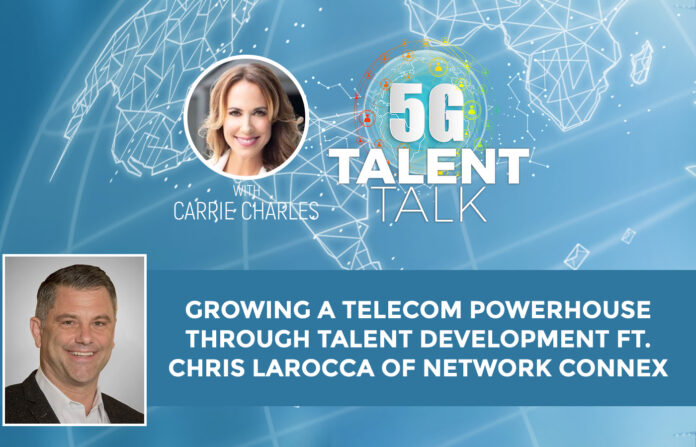When you know what you’re good at, it can pay to stay in your niche. Doing exactly that, Network Connex has found success by focusing on the areas of their core competencies and differentiated expertise. An organization of five business units, Network Connex is focused on the professional and engineering services in digital infrastructure.
In today’s episode, host Carrie Charles is joined by Chris Larocca, CEO and President of Network Connex. Listen along as Chris describes the strategies Network Connex uses to competitive in this multibillion-dollar market, and learn more about the role that organizational and talent development plays in attracting and retaining a skilled workforce.
—
Watch the episode here
Listen to the podcast here
Growing a Telecom Powerhouse Through Talent Development Ft. Chris Larocca of Network Connex
Thank you for joining me on the show. It’s so good to see you. I would like to introduce you to someone very special. My guest is Chris Larocca. He is the President and CEO of Network Connex. Chris, thanks so much for joining me.
It’s great to see you, Carrie. How are you?
I am doing great. I’m excited about our conversation.
Likewise.
As we always do, I’d like to get to know you a little bit and find out how you got to the seat you’re in.
I’d be happy to walk you through that journey. Education-wise, I studied engineering coming out of school and moved into a technical sales program with General Electric. I don’t want to date myself but it was in the mid-‘90s. I was selling commercial and industrial lighting and moved up through the organization within GE.
I had a technical background and selling a technical product. At that time, in General Electric’s history, Six Sigma was a very big initiative and I became a Six Sigma black belt. That gave me a chance to move into some operational roles. I went back to headquarters and did some optimization around warehouse and margin pricing. It gave me a chance within the first few years of my career to touch the engineering box, the sales box and the operations box.
I realized at that point that I needed to have a little bit of financial acumen. I went back to grad school and got my MBA in Corporate Finance. At that point, I thought of all of the cross-functional skills to get into some GM jobs. I moved up through the organization at GE. I was the Chief Operating Officer for a public company called EMCORE Corporation in the semiconductor space but I was the number two guy there. I wanted to have that strategic control over a business. I got an opportunity after that to move into private equity. Last several years, I’ve been running portfolio businesses for private equity companies and I love it.
Here you are. Tell us about Network Connex. Tell us the story.
Network Connex is an organization of five diverse business units. It’s owned by ORIX Capital Partners. It’s a portfolio business for them. It’s focused on digital infrastructure but around professional services and engineering services. Depending on the division, we do everything from fiber splicing, data center design and implementation, wireless construction, site acquisition design and things in the cable television market, everything related to that digital infrastructure that’s enabling wireless, fiber and telecom applications. It’s an exciting part of the market. There are a lot of tailwinds, which we can certainly talk about here.
Can you list those companies that makeup Network Connex?
National Technologies, which is headquartered in Chicago or NTI as it’s known, is a big player in data center design and implementation and also, fiber splicing. That’s been their niche for many years. We have a VERTICOM business, which is based in Dallas, Texas. They’re doing a lot of wireless construction, fiber construction and macro towers.
We have our Advantage Engineers business, which is around wireless engineering design. They’re headquartered out of Columbia, Maryland offices coast to coast and do a lot of design work for the big telecom carriers. We have Fair Haven Business, which is headquartered in Atlanta, Georgia. It focused on both the MSO, the cable television sector, as well as data center market. We call it Inside Plant. We have another business that is also based in Chicago called CCSI, which is doing more micro tower, small cell type of design site acquisition and installation.
What’s your growth strategy for Network Connex?
Each of those five businesses that I mentioned, other than Advantage Engineers which is coast to coast, the other businesses are a bit more regionally focused but dominant players in those regions. What we want to try and do is ultimately take our competencies within Network Connex’s portfolio and go to market with a unified service line offering. Whether it’s a service line that’s traditionally been born out of the NTI business, the VERTICOM business or the Advantage Engineers business. We want to be able to offer that to our customers coast to coast. Replicate our competency but do it from East Coast to West Coast and have a unified service offering to the market.

Would you say that that’s your differentiator or is there something else that sets you apart?
Our differentiator is we know what we’re good at and we try and stay in that very tight box. When you look at the markets that we’re playing in, it’s a $200 billion market so there are a lot of things that we could do going up and down the vertical integration chain but we choose to focus where we have core competencies and differentiated expertise.
If you know what you’re good at, it’s better to just stay inside that very tight box.
Take NTI for instance. It’s a dominant player in fiber splicing and the data center market. There are certainly more things that we can do in that market but we choose to focus and be experts where we’re good. It’s the same thing in the Advantage Engineers business. A lot of times, we’re at the front end of where a new 5G cell tower will be designed, installed or implemented but we don’t want to get into the construction of that, even though we certainly could because we’re on the front end of that project. We like to keep ourselves at the professional services level of that part of the food chain if you will. Differentiating in areas where they’re highly skilled and we have a unique skillset is where we like to stay within.
Speaking of highly skilled, our workforce is very challenging, to say the least. Every leader I have on the show and talk to is saying the same thing over and over again. No matter what happens in the economy, still have a challenge in finding skilled labor. What is your perspective on the industry workforce? Do you think it’s going to be any better in 2023, maybe get worse or stay the same? What are your thoughts?
First off, I’ve been running businesses for many years. This is the most challenging labor market I’ve ever worked within. It certainly has been difficult. For us, we’ve been having tremendous growth that would be even greater had we had access to more talent. It’s certainly a tight market. There are some initial signs of it getting better. I’d say it’s stabilized. It’s been pretty consistent in the second half of 2022.
I don’t anticipate it getting worse but I wouldn’t say necessarily that we’re anticipating getting a heck of a lot better in 2023. What we’re basing our resource needs around is a flat market as far as getting access to talent. It’s difficult out there but we’ve been able to attract some good folks. The business is winning. When players and employees are winning, they want others to come along with it.
We’ve been fortunate to have our current employee base be our best recruiters out there in getting additional resources into the business. I try and over-communicate to with our employees. We got a great story to tell and it’s a fun story to tell. When I go around to all of our offices, we’ve got probably 40 offices coast to coast. I love to tell that story. That enthusiasm is helping get some additional talent in-house. We’ve got plenty of open roles.
Chris, the fact that you physically go to 40 offices throughout the country, tell that story and inspire everyone makes a difference right there, for sure.
We’ve got a great story and it’s a fun one to tell. I love getting out into the field, not only talking with our employees but with customers as well. Certainly, with a lot of the tail ones we see in our end-user markets, it’s been fun to get out there.
Is there anything, in particular, that is working for you and your leaders when it comes to attracting or even retaining talent? Any strategies that you’re using or any particular areas that you’re sourcing from? Any secrets you can share with us?
We don’t want to reveal all our secrets. For me, organizational development is number one. People want to do business with people that they enjoy working with like people want to work for people that they enjoy working for. Leadership and the talent that we have, not only on my staff but levels 2 and 3 down is a big difference. I could tell you the single biggest reason that I’ve learned that people leave a business is because of their manager. The extent that I am keeping the best and brightest leaders in our business is helping matriculate that down throughout the organization.
People want to do business with people that they enjoy working with. A lot of people leave their businesses because of their manager.
I’ll be honest, I did make changes when I joined Network Connex to the leadership level because I believe that’s one of the biggest differentiators for a company to be successful. For me, it’s making sure that we’re driving the right culture. We want to win, have fun and make sure that we’re keeping very sharp people. That model has been working for us.
Tell me more about the culture of Network Connex.
I know that if people didn’t need to put food on their tables, they probably wouldn’t be working here. That’s why it’s called a job. We try and make it at least as fun as possible while we’re here. We do a lot of team-building activities, whether it’s ball games. I was at a gala event in Dallas, Texas. We try and do a lot of things outside the offices. We try and involve spouses and significant others.
We spend so much of our time at the office. We need to share a little bit of that outside the office. Having the message that even though we’re grinding away every day, we’re winning that battle in the field. Being able to do some team-building things with your significant other makes a big difference. That’s been something that resonated with our workforce.
When people form relationships and bonds within a company, that’s great for retention as well. They want to stay. They have those relationships. Some of their best friends they work with. That’s brilliant. Look at a strategy for training and development in our workforce. For as long as I can remember, people want a career path. They want to know that they go into an organization and they see growth. They can see themself in the future. What is your strategy for developing people and helping them to get to where they want to be from a career standpoint?
I try and look at my journey. I remember when I got out of school, I moved all over the country for the first 10 or 15 years of my career. It’s because I always wanted that next position that was going to continue to grow and develop me. When I’m in a position to put processes in place to enable other career growth paths, I try and reflect on what I wanted. You’re right. In 2021, I sat through four exit interviews. All four people left the company because they weren’t being communicated with what a career path could look like. It was a shame because we have such a tremendous growth path.
One thing that I did is we put in a new function. It’s a talent development manager. He’s charged with making sure that we’re cross-training and that we’re doing coaching, whether it’s executive coaching or other mentoring with first-time leaders to make sure that we’re staying on top of everyone’s opportunity to have career growth.

It doesn’t matter if it’s in one business your entire career or you go cross-operating company. We want to make sure that people feel like they could end their careers here and there are plenty of opportunities for them to do that. Oftentimes, I don’t think that message gets down to our employees. That’s one thing I want to make sure that we bridge. That’s what this talent development role and leadership position is supposed to do. We added it. I’m bullish about it.
I’ve been asking around about you. I have heard that you are a phenomenal leader. I want to ask you some questions about leadership. From your view, what would you say are three leadership skills that every great leader needs in our new world of work?
I had a conversation where somebody asked me that, one of our presidents. For me, the director that I would give to a new president or anybody leading an organization, whether it’s a functional area, an operating company or a CEO position, comes down to three things. As a CEO or a leader in your area, you’ve got three responsibilities. One is to put a strategy together. We’re so tactical every single day. We’re worried about making the week, the month and the quarter but you have to have that strategic mindset.

I believe that drives a lot of the decision-making you make that will impact not only decisions this week but 2 to 3 years down the road. One, be a strategic thinker and have a strategic plan. It could be for your company, your business or your function but number two, we already touched on it. Organizational development, HR, do you have the right people or athletes to execute that strategic plan? To me, the biggest thing that will make or break an organization is making sure that you have the right people. Coach them and develop them. If you can’t do that, then maybe invite them to work somewhere else. Maybe that employee is better suited to a different environment.
The third one, which is the one that I enjoy the most is be that Chief Sales Officer, whether it’s an internal customer or an external customer. For me, most of the time, it’s an external customer. Sit in front of a customer and give them the reassurance that they have a problem. If you’re their vendor, they know that they can go to the top leader in the function or the company to get that problem resolved. To me, those are the top three things. Any good leader in my experience, if they possess those, they tend to be very successful.
I love the last one. I’ve never heard it quite put like that but I identify with it because I’m also the Chief Sales Officer. I sit in that seat too. How do you then identify potential leaders within the organization? How do you know who is going to be the right person for the right role?
That’s very key. Sometimes it’s understanding what does an employee want to do? Some people want to be functional leaders. They want to be a deep player in operations or sales. There’s nothing wrong with that. A lot of people make great careers there but there are others like me. You knew that I wanted to be a GM, a President and a CEO.
If you want to identify potential leaders within your organization, you need to understand what each employee wants to do.
Make sure that that person is developing the skillsets. I don’t think it’s fair to put somebody into a presidential position when they’ve only had experience in one functional area. There are so many cross-functional things that you have to have a little bit of knowledge about. It’s that old saying, “A jack of all trades but a master of none.” You have to know a little bit about every function. I have an MBA. I recognize that was a gap for me.
You don’t want me putting together the financial statements for the company but I know enough to not get out hustled at the board table when I’m talking to our CFO. Sorry, Chad. At least I have a little bit of knowledge where I can weigh in on certain things. It’s identifying what a person wants to do. There’s no shame in somebody saying, “I want to be a safety leader my whole career.” That’s great. It’s matching needs and wants of the business. Once you understand that, move those individuals along to maybe check off those skillsets that they need in that journey.
You think big, Chris so what’s your five-year vision for Network Connex?
We have an opportunity to be a premier provider in the complete digital infrastructure world in certain areas where we have some value that we can add to the market. We are still regional, I’ll be honest with you. We’ve got pockets of strength. I would like to see that strength across all five operating companies be coast to coast and be a provider, whether it’s fiber, outside plant, wireless or data centers. We want to be the go-to provider, whether it’s a project in New York City or Los Angeles and everywhere in between. We can do that. We’ve got a very succinct plan to get there. I hope it doesn’t take us five years to get there. We’ll get there.
Chris, every time that we’ve met and I’ve been around you, you’ve had this infectious energy. You’re so driven. You light me up. I get excited when we finish our meetings. I want to know what drives you. What’s your why? What makes you turn on that engine first thing in the morning and go all day long?
I’m always selective in businesses that I take on to lead. With this one, we’re enabling this. We’re enabling a whole migration in bandwidth. The fact that we play a big part in that to me is exciting. Looking five years down the road to say that we were part of that and we played into a 5G rollout, a 6G rollout, bandwidth being deployed all over so you can stream video, to me that’s exciting. That gets me going every morning.
How can we learn more about Network Connex and the jobs you have open? I’m sure you’re hiring.
We are. We have a tremendous amount of opportunities and a lot of openings. If you go to our website, NetworkConnex.com, all of our open positions are listed there.
I’m sure everybody is going to be running to their computer to find those open roles. Chris, thank you so much. This has been engaging. I can’t wait to see you again. Thanks for coming to the show.
Thanks, Carrie. You’re always good to chat.
Important Links
- Network Connex
- ORIX Capital Partners
- National Technologies
- VERTICOM
- Advantage Engineers
- Fair Haven Business
- CCSI
- CHamassian@NetworkConnex.com
About Chris Larocca
 Chris has over 20 years of experience successfully leading and managing highly profitable and growth-oriented companies. Prior to joining Network Connex, Chris was the President & CEO of Nortek Control, a global leader in artificial intelligence, facial recognition, smart connected systems for security and home automation, access control, and digital health markets. Chris led the company through a hyper-growth phase until its sale in mid-2021. In addition, he has also held CEO and executive management positions at Dover Corporation, General Electric and Luminance Brands. Chris gained fiber and telecom experience as the COO of EMCORE Corporation, a leading provider of components and subsystems for optical high-speed data and video networks. In his role as President and CEO of Network Connex, Chris is focused on working with the company’s leadership team to accelerate Network Connex’s positioning as a global leader in communications infrastructure design and implementation.
Chris has over 20 years of experience successfully leading and managing highly profitable and growth-oriented companies. Prior to joining Network Connex, Chris was the President & CEO of Nortek Control, a global leader in artificial intelligence, facial recognition, smart connected systems for security and home automation, access control, and digital health markets. Chris led the company through a hyper-growth phase until its sale in mid-2021. In addition, he has also held CEO and executive management positions at Dover Corporation, General Electric and Luminance Brands. Chris gained fiber and telecom experience as the COO of EMCORE Corporation, a leading provider of components and subsystems for optical high-speed data and video networks. In his role as President and CEO of Network Connex, Chris is focused on working with the company’s leadership team to accelerate Network Connex’s positioning as a global leader in communications infrastructure design and implementation.
Love the show? Subscribe, rate, review, and share!
Join the 5G Talent Talk Community today:

